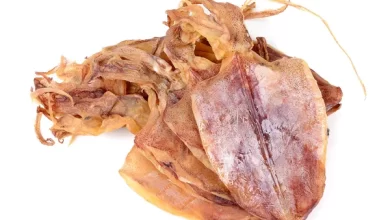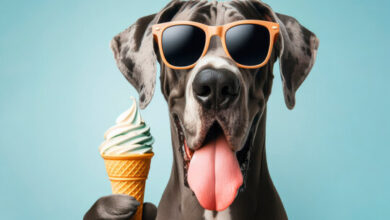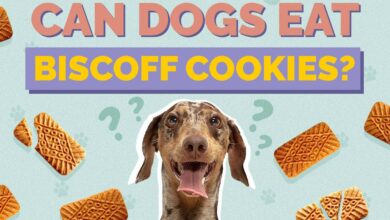Can Dogs Have Provolone Cheese? Find Out Here! 2024

Have you ever found yourself enjoying a slice of Provolone cheese and wondered, “Can dogs have Provolone cheese?” It’s a question many of us ponder, especially when those hopeful puppy eyes are fixed on our snack. In this article, we’ll explore whether Provolone cheese is a safe option for your dog and what you should consider before sharing a bite. So, let’s dive in and discover if your pup can enjoy some Provolone cheese with you! ??So now let’s explore –can dogs have Provolone cheese?
Nutritional Composition of Provolone Cheese
Provolone cheese, a popular semi-hard Italian cheese, offers a range of nutritional components that can impact a dog’s diet. This section explores the key elements of Provolone cheese, including its protein content and benefits, fat levels and implications for dogs, sodium content and health considerations, and lactose presence and potential issues.
Protein Content and Benefits
- Rich in Protein: Provolone cheese is a valuable source of protein, providing essential amino acids necessary for muscle development, tissue repair, and overall bodily functions in dogs.
- Muscle Support: Protein supports muscle growth and maintenance, helping dogs to maintain strength and vitality throughout their lives.
- Satiety: Including protein-rich foods like Provolone cheese in a dog’s diet can promote feelings of fullness and satisfaction, aiding in weight management.
Fat Levels and Implications for Dogs
- Moderate to High Fat Content: Provolone cheese contains moderate to high levels of fat, contributing to its creamy texture and rich flavor.
- Weight Management: Excessive consumption of high-fat foods like Provolone cheese can lead to weight gain and obesity in dogs, increasing the risk of health issues such as joint problems, heart disease, and diabetes.
- Portion Control: It’s important to offer Provolone cheese in moderation and to monitor a dog’s overall fat intake to maintain a healthy weight and prevent obesity-related complications.
Sodium Content and Health Considerations
- Significant Sodium Levels: Provolone cheese contains notable amounts of sodium, which acts as a preservative and flavor enhancer.
- Health Risks: High sodium intake can lead to health issues in dogs, including hypertension, kidney damage, and dehydration. Dogs with pre-existing health conditions may be particularly susceptible to the adverse effects of high sodium levels.
- Monitoring Intake: Limiting the amount of Provolone cheese given to dogs can help mitigate the risk of excessive sodium intake and associated health complications.
Lactose Presence and Potential Issues
- Presence of Lactose: Provolone cheese contains lactose, a type of sugar found in milk and dairy products.
- Lactose Intolerance: Many dogs lack the enzyme lactase needed to properly digest lactose, leading to gastrointestinal issues such as diarrhea, gas, and bloating when consuming dairy products like Provolone cheese.
- Sensitivity Awareness: Owners should be aware of potential lactose intolerance in their dogs and monitor for any adverse reactions after feeding Provolone cheese.
Understanding the nutritional composition of Provolone cheese is crucial for making informed decisions about its inclusion in a dog’s diet. While it can offer some nutritional benefits, it’s essential to balance these with potential risks and to offer Provolone cheese in moderation as part of a balanced diet.
Health Benefits of Provolone Cheese for Dogs
It known for its rich flavor and creamy texture, can offer several health benefits for dogs when included as part of a balanced diet. This section explores the potential advantages, including its role as a high-quality protein source for muscle maintenance, provision of essential vitamins and minerals, enhancement of palatability in meals or treats, and potential dental benefits through chewing.
High-Quality Protein Source for Muscle Maintenance
- Muscle Development: It serves as a valuable source of high-quality protein, supplying essential amino acids necessary for muscle development and maintenance in dogs.
- Tissue Repair: Protein supports tissue repair processes, aiding in the recovery from injuries or physical exertion.
- Energy Metabolism: Protein contributes to the overall energy metabolism of dogs, ensuring optimal function of bodily processes.
Essential Vitamins and Minerals
- Calcium: Provolone cheese is rich in calcium, a crucial mineral for maintaining strong bones and teeth in dogs. Adequate calcium intake is essential for skeletal health and proper growth, especially in young puppies and senior dogs.
- Vitamin A: This vitamin is essential for supporting healthy vision, immune function, and skin health in dogs. Provolone cheese provides a natural source of vitamin A, contributing to overall well-being.
- Other Essential Nutrients: Provolone cheese contains various other vitamins and minerals, including phosphorus, vitamin B12, and zinc, which play vital roles in maintaining overall health and vitality in dogs.
Enhancing Palatability of Meals or Treats
- Appetite Stimulation: It has a rich flavor and enticing aroma that can enhance the palatability of meals or treats, encouraging dogs to eat and enjoy their food.
- Training Aid: The appealing taste of it makes it an effective training aid, allowing owners to reinforce positive behaviors and facilitate training sessions with their dogs.
Potential Dental Benefits Through Chewing
- Chewing Action: Chewing on small pieces of it can help promote dental health in dogs by stimulating saliva production and reducing plaque buildup on teeth.
- Texture: The texture of it encourages dogs to chew thoroughly, which can help remove food particles and debris from their teeth, promoting oral hygiene.
While it can offer several health benefits for dogs, it’s essential to offer it in moderation and as part of a balanced diet. Consultation with a veterinarian can ensure that Provolone cheese is suitable for your dog’s specific dietary needs and health conditions.
Risks and Drawbacks of Provolone Cheese for Dogs
While Provolone cheese can offer some nutritional benefits for dogs, it’s essential to be aware of the potential risks and drawbacks associated with its consumption. This section explores the key concerns, including its high fat content leading to obesity risks, elevated sodium levels and potential for hypertension, lactose intolerance and digestive issues, and allergic reactions or sensitivities.
High Fat Content Leading to Obesity Risks
- Caloric Density: Provolone cheese contains significant levels of fat, contributing to its creamy texture and rich flavor. Excessive consumption of high-fat foods like Provolone cheese can lead to weight gain and obesity in dogs.
- Obesity Risks: Obesity in dogs can increase the risk of various health issues, including joint problems, heart disease, and diabetes. It’s important to offer Provolone cheese in moderation and to monitor a dog’s overall caloric intake to maintain a healthy weight.
Sodium Levels and Potential for Hypertension
- Salt Content: Provolone cheese contains notable amounts of sodium, which acts as a preservative and flavor enhancer. High sodium intake can lead to hypertension (high blood pressure) in dogs, increasing the risk of heart disease and kidney damage.
- Health Risks: Dogs with pre-existing health conditions, such as heart disease or kidney problems, may be particularly susceptible to the adverse effects of high sodium levels. It’s crucial to monitor the sodium content of your dog’s diet and limit their intake of salty foods like Provolone cheese.
Lactose Intolerance and Digestive Issues
- Presence of Lactose: Provolone cheese contains lactose, a type of sugar found in milk and dairy products.
- Lactose Intolerance: Many dogs lack the enzyme lactase needed to properly digest lactose, leading to gastrointestinal issues such as diarrhea, gas, and bloating when consuming dairy products like Provolone cheese.
- Sensitive Stomachs: Dogs with sensitive stomachs or lactose intolerance may experience digestive discomfort after consuming Provolone cheese. It’s important to monitor for any adverse reactions and adjust their diet accordingly.
Allergic Reactions or Sensitivities
- Protein Allergens: Some dogs may be allergic to the proteins found in dairy products like Provolone cheese.
- Allergic Symptoms: Allergic reactions can manifest as itching, skin rashes, ear infections, or gastrointestinal distress. If your dog exhibits signs of allergic reactions after consuming Provolone cheese, consult with a veterinarian for guidance on appropriate dietary adjustments.
Understanding these risks and drawbacks of feeding Provolone cheese to dogs is essential for making informed decisions about their diet and overall health. By offering Provolone cheese in moderation and monitoring for any adverse reactions, you can help ensure the well-being of your furry friend.
Guidelines for Safely Feeding Provolone Cheese to Dogs
Provolone cheese can be a tasty and enjoyable treat for your dog when offered responsibly. To ensure their health and well-being, it’s essential to follow these guidelines for safely feeding Provolone cheese to dogs. This section outlines the key steps, including introducing it in small amounts, observing for any adverse reactions, selecting low-fat or reduced-sodium varieties, and providing recommendations for frequency and quantity.
Introduce in Small Amounts
- Start Slowly: Begin by offering your dog a small amount of Provolone cheese to gauge their tolerance and reaction. This helps prevent any potential digestive issues and allows you to observe how your dog responds to the new treat.
- Monitor Response: Pay close attention to your dog’s behavior and any changes in their stool or overall well-being after consuming Provolone cheese. If they show no adverse reactions, you can gradually increase the portion size over time.
Observe for Any Adverse Reactions
- Watch for Symptoms: After giving your dog Provolone cheese, closely monitor them for any signs of gastrointestinal upset, such as vomiting, diarrhea, or excessive gas. Also, observe for any signs of allergic reactions, such as itching, skin rashes, or ear infections.
- Immediate Action: If you notice any adverse reactions, discontinue feeding Provolone cheese and consult your veterinarian for guidance on appropriate dietary adjustments.
Select Low-Fat or Reduced-Sodium Varieties
- Healthier Options: Choose low-fat or reduced-sodium varieties of Provolone cheese to minimize the potential health risks associated with high-fat and sodium content.
- Nutritional Balance: These healthier options can help ensure that your dog enjoys the treat without negatively impacting their overall dietary balance.
Frequency and Quantity Recommendations (Occasional Treat)
- Moderation is Key: Provolone cheese should be given as an occasional treat rather than a regular part of your dog’s diet. This helps prevent excessive intake of calories, fat, and sodium.
- Portion Control: Offer Provolone cheese in small, manageable portions, and avoid feeding it too frequently to prevent overconsumption.
By following these guidelines, you can safely introduce Provolone cheese into your dog’s diet, allowing them to enjoy this tasty treat without compromising their health. Always remember that moderation and careful monitoring are essential to ensure that any new food is a positive addition to your pet’s diet.
Exploring Other Dog-Friendly Cheese Options
While Provolone cheese can be a tasty treat for dogs, there are several alternative cheeses that may be more suitable and beneficial for canine consumption. This section explores some dog-friendly cheese options, highlighting their benefits, suitability, and considerations.
Cottage Cheese: Benefits and Suitability
- Low-Fat, High-Protein: Cottage cheese is an excellent option for dogs due to its low-fat content and high protein content, making it suitable for those needing to manage their weight.
- Digestibility: Cottage cheese is generally easy to digest, making it suitable for dogs with sensitive stomachs or digestive issues.
- Calcium: It is also a good source of calcium, promoting strong bones and teeth in dogs. Additionally, cottage cheese can be a valuable addition to the diet of lactating or pregnant dogs due to its high calcium content.
Mozzarella: Low-Fat and Digestibility Factors
- Low-Fat Option: Mozzarella cheese is another low-fat option that can be included in a dog’s diet. Its lower fat content makes it suitable for dogs that need to avoid high-fat foods.
- Easily Digestible: Mozzarella is generally easier for dogs to digest compared to other cheeses, reducing the risk of gastrointestinal issues. It can be a good choice for dogs with sensitive stomachs or digestive sensitivities.
Cheddar: Popularity and Moderation Advice
- Widely Available: Cheddar cheese is a common household cheese that many dogs enjoy. It can be used as a high-value treat during training sessions or as a topping for meals.
- Moderation is Key: However, cheddar cheese should be given sparingly due to its higher fat content, which can contribute to weight gain and other health issues if overconsumed. Offer cheddar cheese in small portions and monitor your dog’s overall caloric intake.
Swiss Cheese: Lower Lactose Content Advantages
- Low Lactose Content: Swiss cheese contains lower levels of lactose compared to many other cheeses, making it a suitable option for dogs that are lactose intolerant.
- Gentler on Digestion: Its lower lactose content reduces the likelihood of digestive upset, making it a safer choice for dogs with sensitive stomachs or lactose intolerance.
These alternative cheese options can be great additions to your dog’s diet, provided they are given in moderation and are compatible with your dog’s dietary needs. Always consult with a veterinarian before introducing new foods to ensure they are appropriate for your specific pet.



